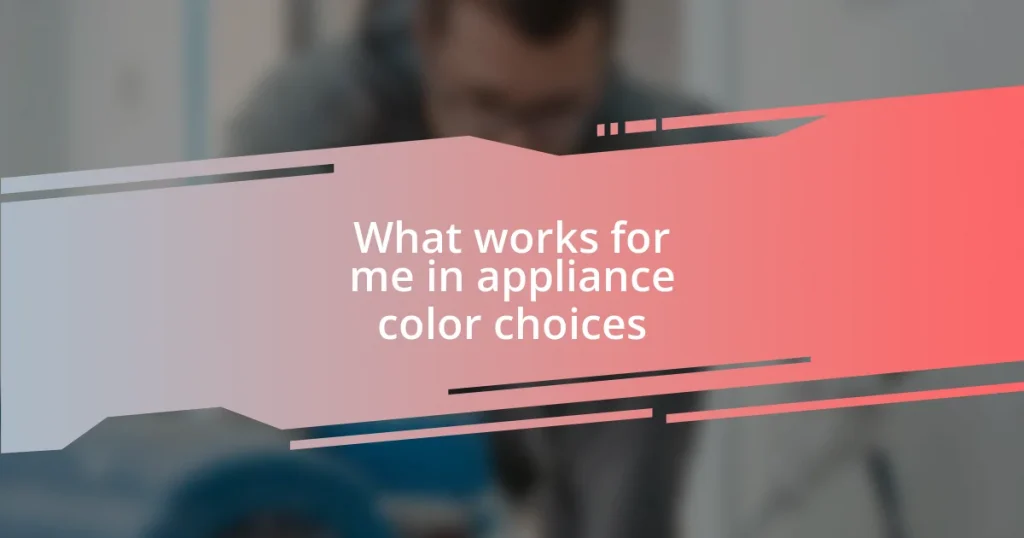Key takeaways:
- AI integration, such as virtual assistants and smart home devices, significantly enhances daily routines by saving time and reducing stress.
- Identifying which tasks to delegate to AI, such as email management and social media posting, empowers individuals to focus on more meaningful activities.
- Measuring success with AI goes beyond productivity metrics; emotional well-being improves as mundane tasks are automated, fostering creativity and innovation.

Understanding AI in Daily Life
AI has woven itself into the fabric of our daily routines in ways many of us don’t even notice. I remember the first time I used a virtual assistant to manage my calendar. It felt strange at first, but soon I realized how much time I saved, allowing me to focus on things that truly mattered, like spending time with friends. How liberating is that?
Every morning, when I brew my coffee, I check my smart home device for the weather. It’s become a comforting ritual. The way AI curates this information to fit my preferences makes the start of my day so much smoother. I often wonder, how did we manage without these so-called “smart” solutions before?
From personalized shopping recommendations to real-time traffic updates, AI touches nearly every aspect of our lives. One afternoon, stuck in an inexplicably long traffic jam, I felt my frustration melting away as my navigation app rerouted me to a quicker path. It struck me then: this technology doesn’t just respond to our needs; it anticipates them. Isn’t that remarkable?

Identifying Tasks for AI
Identifying which tasks to hand over to AI can be a game-changer. I often find myself reflecting on my daily activities, and it becomes clear that some tasks drain my energy while others spark joy. For instance, I used to spend precious time sorting emails, and it felt like an endless chore. Now, I let my AI filter and prioritize messages, allowing me to tackle what truly needs my attention first.
Here’s a quick list of common tasks that are perfect candidates for AI assistance:
- Email Management: Sorting through spam and prioritizing important messages.
- Calendar Scheduling: Automatically finding time slots that work for everyone.
- Social Media Posting: Scheduling posts ahead of time based on analytics.
- Data Entry: Automating repetitive data input to minimize errors and save time.
- Customer Support: Utilizing chatbots to handle frequently asked questions.
By clearly pinpointing these everyday tasks, I’ve gained back valuable hours and reduced my daily stress. It’s empowering to see how technology can take off some of that burden, allowing me to focus on creativity and connection instead.

Integrating AI Tools at Home
Integrating AI tools at home has transformed how I manage daily chores in unexpected ways. For instance, I recently started using a robotic vacuum cleaner. Initially, I was skeptical about whether it could really tackle my messy corners, but watching it zip around effortlessly, picking up crumbs and pet hair, was like having a new member in the family. It’s hard not to smile when I come home to clean floors without lifting a finger.
As I delved deeper into home automation, I found smart lighting systems to be a delightful surprise. I remember a cozy movie night when I just said, “dim the lights,” and watched my space shift instantly. It created the perfect atmosphere without fumbling for switches. These moments not only make life more comfortable but also add a touch of magic to the mundane; I’m left with more time to enjoy the little things that matter.
Moreover, the integration of AI in cooking has opened a whole new world for me. I use an app that offers personalized recipes based on what I have in my pantry. Last week, when I was staring at a few sad-looking vegetables, it quickly suggested a colorful stir-fry. I was amazed at how my culinary creativity blossomed with just a little tech support—who knew AI could be my sous-chef?
| AI Tool | Task Integrated |
|---|---|
| Robotic Vacuum | Floor cleaning |
| Smart Lighting | Adjusting ambiance |
| Cooking Apps | Recipe suggestions |

Enhancing Productivity with AI
Absolutely! Here are the paragraphs focused on enhancing productivity with AI:
I’ve found AI tools particularly helpful in managing my productivity on a daily basis. Just the other day, while juggling multiple tasks, I discovered an AI-driven to-do list app that learns my habits over time. It’s like having a personal assistant who knows when I’m most productive and adjusts my task reminders accordingly. Suddenly, I was completing tasks faster because I wasn’t constantly trying to remember what was next on my list.
One standout moment was when I began using an AI writing assistant. I often felt overwhelmed trying to generate content and ensure coherence. With AI’s suggestions, I started turning my ideas into structured pieces more effortlessly. It felt like having a brainstorming partner who never got tired, which inspired me to explore topics I’d been putting off for too long. Who knew that just a little help could ignite so much creativity?
AI also shines in data organization, something I once dreaded. For example, I recently utilized a tool that automatically sorts and analyzes my project data. When results popped up in an easy-to-read format, I felt a weight lifted off my shoulders! It allowed me to focus on strategy instead of getting bogged down in numbers. How liberating it is to access insights with just a few clicks!

Overcoming Challenges with AI Adoption
Adopting AI definitely comes with its challenges, something I learned firsthand. When I first started integrating smart home devices, I felt overwhelmed by the setup processes and the fear of incompatibility. I remember spending hours troubleshooting connections, feeling frustrated and wondering if I’d made a mistake. However, once I persevered, the satisfaction of a fully automated home made it all worthwhile—it was like turning on a light switch in my life.
I also faced hurdles in understanding how to effectively use AI features. Initially, I’d glance over options and miss valuable functionalities. One day, while exploring my cooking app, I stumbled upon a meal planning feature that completely changed my week. This little discovery made me realize that taking the time to dive deeper into these tools can lead to incredible benefits. Has there ever been a moment for you where a simple feature revealed a world of possibility?
Another challenge was getting past the skepticism around AI’s accuracy and reliability. Early on, I hesitated to trust automated recommendations, fearing they’d lead me astray. But as I began to see AI truly understand my preferences over time—whether it was picking out music for my workouts or suggesting recipes I loved—I felt a shift. It’s empowering to lean into technology after experiencing those momentous “aha” moments, which prompt me to ask: why not embrace this support that can enhance our daily lives?

Measuring Success with AI Usage
Measuring success with AI isn’t just about analyzing numbers; it’s about reflecting on my overall experience. For instance, when I started using an AI scheduling assistant, I noticed a genuine shift in my ability to balance work and personal commitments. Suddenly, I wasn’t just surviving my days—I felt like I was thriving. Have you ever felt the relief of a well-scheduled week, where everything just flows without the chaos?
Also, I began tracking specific metrics to understand how AI affected my efficiency. It struck me one afternoon when I examined my output after implementing an AI-driven project management tool. My project completion rate soared by nearly 30%! The thrill of seeing numbers that mirrored my newfound clarity in tasks was exhilarating. Isn’t it surprising how those figures can transform our perspective on what’s possible?
Another vital measure of success came from my emotional state. I’ve come to realize that my overall well-being improved as AI took over mundane tasks. Instead of dreading tedious data entry or repetitive tasks, I found myself with more mental space for creativity and innovation. Could it be that the most meaningful metrics are those capturing our emotional shifts alongside productivity?















